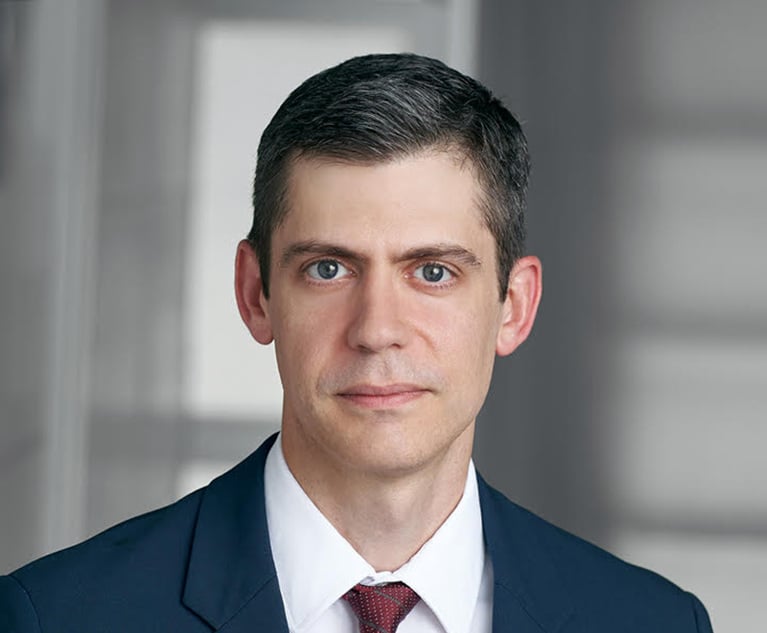Higher Law: Getting 'Comfortable' on the Plant-Touching Side | Meet Dykema's Cannabis Team | Revolving Door? You Bet | Who Got the Work
Brownstein Hyatt Farber Schreck's cannabis practice. Dykema's take on Illinois and Michigan. Nevada's new cannabis regulator. The revolving cannabis door in California.
October 03, 2019 at 04:00 PM
9 minute read
Welcome back to Higher Law, our weekly briefing on all things cannabis. I'm Cheryl Miller, reporting for Law.com from Sacramento. It must be Fall because I got an email pitch for pumpkin spice CBD latte this week.
This week we're looking at:
• Brownstein Hyatt Farber Schreck's cannabis practice • Dykema's take on Illinois and Michigan • Nevada's new cannabis regulator • The revolving cannabis door in California
Thanks for reading. Send me your feedback, your story ideas and your odd pumpkin spice concoction recipes at [email protected]. You can also reach me at 916.448.2935. Follow me on Twitter @capitalaccounts.

Brownstein Hyatt Unveils Cannabis Practice
Law firm and lobbying shop Brownstein Hyatt Farber Schreck formally christened its cannabis practice this summer, even though the firm has been serving clients in and around the space for a while now. The 20-attorney practice, co-chaired by Denver-based Melissa Kuipers Blake and Amy Steinfeld inSanta Barbara, California, handles a range of business, from helping traditional farmers transition to cannabis operations, to M&A activity to lobbying.
"It's really kind of whatever [clients] may need," Kuipers Blake told me. "It's a little less on getting a license side and more so on how to operate a business side."
I spoke with Kuipers Blake about the firm's practice and the big issues affecting its attorneys right now. Here's a bit of our conversation, edited for space and clarity.
Higher Law: Tell me the basics about your practice group.
Kuipers Blake: We essentially launched what's called the emerging regulated industry group about four years ago and that was when the marijuana industry in both Colorado and nationally was maturing. And the firm was a little unclear what to do, how to do it. I mean we want to serve every client we can but there was a lot of uncertainty from a legal perspective. Could lawyers represent cannabis companies without fear of losing their license? What does that look like?
Long story short, I went to our managing partners at the time and I said we've developed an expertise on cannabis in a lot of ways, what if we were to consult with companies that are not in cannabis directly but are in fact impacted by it? So that was what that group did and still does.
 We developed that practice for years. And then in July, given the maturation in the industry nationally, the firm was comfortable to say, we are happy to engage and represent the cannabis industry directly. We got very comfortable on the plant-touching side. We still have an intake process and require background checks. But quite frankly, all of the companies that are operating legally in states have to be background-checked and licensed. So that's good enough for us. If the state gives them a license to do business then our firm is going to represent them.
We developed that practice for years. And then in July, given the maturation in the industry nationally, the firm was comfortable to say, we are happy to engage and represent the cannabis industry directly. We got very comfortable on the plant-touching side. We still have an intake process and require background checks. But quite frankly, all of the companies that are operating legally in states have to be background-checked and licensed. So that's good enough for us. If the state gives them a license to do business then our firm is going to represent them.
What are the biggest issues on your plate right now?
There's the omnipresent concern among the industry about fixing the federal law. It's really an unfortunate position to be in where you go to work at a state-legal business but you're in fear of federal prosecution every single day. So our team in Washington, and this is where I come in a more aggressive way for the practice, we are working daily on Capitol Hill on the SAFE Banking Act.
We're having conversations daily about what that bill could potentially look like in the Senate, who would be willing to support it. As long as we can start getting elected officials and members of Congress comfortable with voting yes on cannabis bills, I think once they do it, it gets a lot easier. We call it muscle memory. We've got to create the muscle memory of voting yes on cannabis when for the last fifty or sixty years everyone has been told to vote no.
Any predictions on what will happen with the SAFE Banking Act?
That is the question of the day. Let me put it this way. We have more momentum than we've ever had and Chairman [Mike] Crapo in the Senate Banking Committee held a hearing on cannabis banking without a vote. He heard a lot of testimony and at the end of that hearing he agreed that something had to be done here, which he has honored in our conversations with his staff.
So as far as timing, I would say in the next six months we're going to have some sort of movement. I can't predict what that is but I think we'll have hearings. We'll potentially have a vote. But the momentum on this is too aggressive to allow policy-makers not to do anything any longer.

Dykema's Cannabis Team on What They See
I dialed in to a press call Wednesday with attorneys from Dykema Gossett LLP's cannabis law practice. They're on the front lines of two states—Michigan and Illinois—trying to launch regulated adult-use marijuana markets.
Here are a few takeaways from the event.
>>> Local permits, real estate and licensing continue to be a big driver of cannabis legal work in Michigan but mergers-and-acquisitions activity is definitely on the uptick in Michigan, said R. Lance Boldrey, leader of the firm's cannabis practice. The firm is also seeing "the front end" of a wave of litigation over marijuana-related business contracts and business disputes. "That's certainly the trend we've seen in other states," Boldrey said.
>>> In Illinois, local municipalities are grappling with whether to allow already-licensed medical marijuana dispensaries to sell recreational products as well when the state-sanctioned market opens on Jan. 1. "Incumbent companies that hold these licenses are understandably upset" when cities and towns say no to adult-use, said Scott Selinger, a government policy advisor in Dykema's Chicago office. Some of those dispensaries want to move to locations where they can sell recreationally, but it's not clear if they can legally do so, Selinger said. The issue may be addressed in clean-up legislation later this fall, he said.
>>> Michigan's ban on flavored e-cigarettes does not apply to cannabis vapes, said Boldrey, but the state order, now under legal challenge, has led to a "modest shift" among some producers to edibles and flower. Boldrey said he knows of one company in the vaping space that has stopped production in response to the ban. His advice? "Be very, very transparent" about what's in vaping products.
>>> Michigan is requiring adult-use licensees to submit social equity plans for their operations, but the state hasn't offered any guidance on what those plans should contain, Boldrey said. Also, local municipalities will be allowed to set caps on the number of adult-use dispensaries, but those caps must be accompanied by a competitive permitting process. "That is going to be a nightmare for communities in Michigan," said Boldrey. "That expertise simply does not reside in the local municipalities."
Who Got the Work
• Lobbyist and former gubernatorial aide Tyler Klimas will be the first executive director of Nevada's Cannabis Compliance Board, the Las Vegas Sun reported. The board is expected to take the regulatory reins of the state's cannabis industry from the Department of Taxation. Klimas served as intergovernmental affairs manager and later press secretary in former Gov. Brian Sandoval's office.
• Rose Law Group partner Adam Trenk has been named director of the Arizona firm's cannabis and hemp departments. Trenk has represented agricultural clients in the state for nearly a decade and also worked with municipalities to draft medical marijuana zoning regulations, the firm said.

In the Weeds…
>> The cannabis industry door revolves, too. More than two dozen former government officials in California are now working for or with regulated cannabis businesses. Among those jumping into the industry are ex-attorney general Bill Lockyer, who co-founded a marijuana distribution company, and five former aides to Gov. Jerry Brown. [Los Angeles Times]
>> The Massachusetts vape ban is under legal attack. The Vapor Technology Association and related businesses sued in federal court Tuesday to end the four-month ban on vaping product sales enacted last week by Gov. Charlie Baker. Saugus attorney Craig Rourke of Rourke Law Office filed a similar suit on behalf of Mass Dynamics, Boston Vapor and Vick's Vape Shop. The lawsuits allege that the state ban is preempted by federal law giving regulatory power to the U.S. Food and Drug Administration. [MassLive]
>> Colorado's federal attorney says he's watching marijuana banking. U.S. Attorney Jason Dunn , a former Brownstein Hyatt partner, said he would never tell financial institutions that serve state-licensed marijuana operators that they're acting lawfully, even if they're following U.S. Treasury guidance. Dunn's office has never prosecuted a bank doing business with state-legal marijuana companies. "But that's not to say we haven't looked at them and that's not to say that we're not continuing to look at them," he said. [Colorado Sun]
>> New Mexico's producers want more plants. Sacred Garden Inc., New Mexico Top Organics-Ultra Health and G&G Genetics sued in state court last week, challenging New Mexico's 1,750-plant limit. The companies say the cap violates a previous court order that requires the state to set a limit based on "reliable" or "updated" data on supply needs. [Santa Fe New Mexican]

Calendar: What's Next
Oct. 8-9 - The California Cannabis Business Conference, sponsored by NCIA, takes place in Long Beach, California. Attorneys scheduled to speak at the event include Arnold & Porter counsel Bryant Godfrey; Christopher Phillips, chief counsel of the California Cannabis Control Appeals Panel; and Henry Wykowski of Wykowski Law.
Oct. 10-11 - Cannabis tech conference New West Summit takes place in San Francisco. Scheduled speakers include Regal tax law attorney Regina Unegovsky, Hoban Law Group counsel Patrick Goggin and Feldmann Nagel Cantafio managing partner Charles Feldmann.
Oct. 11-12 - CBD Expo Mountain 2019 runs for two days in Denver. Attorneys on the agenda include Gleam Law managing partner Neil Juneja; Emerge Law Group attorney Alex Berger; and Jonathan Havens, co-chair of the cannabis law practice at Saul Ewing Arnstein & Lehr.
This content has been archived. It is available through our partners, LexisNexis® and Bloomberg Law.
To view this content, please continue to their sites.
Not a Lexis Subscriber?
Subscribe Now
Not a Bloomberg Law Subscriber?
Subscribe Now
NOT FOR REPRINT
© 2025 ALM Global, LLC, All Rights Reserved. Request academic re-use from www.copyright.com. All other uses, submit a request to [email protected]. For more information visit Asset & Logo Licensing.
You Might Like
View All
NY Cannabis Marketing Rulings / Rescheduling Effects / Honigman's Work on Trademark Suit / Goodbye
9 minute read
Workplace Weed and Labor Pacts / State AGs and Hemp / Maryland Licensing Suit / Vicente Sues Recruiter
9 minute readTrending Stories
- 1Big Law's Middle East Bet: Will It Pay Off?
- 2'Translate Across Disciplines': Paul Hastings’ New Tech Transactions Leader
- 3Milbank’s Revenue and Profits Surge Following Demand Increases Across the Board
- 4Fourth Quarter Growth in Demand and Worked Rates Coincided with Countercyclical Dip, New Report Indicates
- 5Public Notices/Calendars
Who Got The Work
J. Brugh Lower of Gibbons has entered an appearance for industrial equipment supplier Devco Corporation in a pending trademark infringement lawsuit. The suit, accusing the defendant of selling knock-off Graco products, was filed Dec. 18 in New Jersey District Court by Rivkin Radler on behalf of Graco Inc. and Graco Minnesota. The case, assigned to U.S. District Judge Zahid N. Quraishi, is 3:24-cv-11294, Graco Inc. et al v. Devco Corporation.
Who Got The Work
Rebecca Maller-Stein and Kent A. Yalowitz of Arnold & Porter Kaye Scholer have entered their appearances for Hanaco Venture Capital and its executives, Lior Prosor and David Frankel, in a pending securities lawsuit. The action, filed on Dec. 24 in New York Southern District Court by Zell, Aron & Co. on behalf of Goldeneye Advisors, accuses the defendants of negligently and fraudulently managing the plaintiff's $1 million investment. The case, assigned to U.S. District Judge Vernon S. Broderick, is 1:24-cv-09918, Goldeneye Advisors, LLC v. Hanaco Venture Capital, Ltd. et al.
Who Got The Work
Attorneys from A&O Shearman has stepped in as defense counsel for Toronto-Dominion Bank and other defendants in a pending securities class action. The suit, filed Dec. 11 in New York Southern District Court by Bleichmar Fonti & Auld, accuses the defendants of concealing the bank's 'pervasive' deficiencies in regards to its compliance with the Bank Secrecy Act and the quality of its anti-money laundering controls. The case, assigned to U.S. District Judge Arun Subramanian, is 1:24-cv-09445, Gonzalez v. The Toronto-Dominion Bank et al.
Who Got The Work
Crown Castle International, a Pennsylvania company providing shared communications infrastructure, has turned to Luke D. Wolf of Gordon Rees Scully Mansukhani to fend off a pending breach-of-contract lawsuit. The court action, filed Nov. 25 in Michigan Eastern District Court by Hooper Hathaway PC on behalf of The Town Residences LLC, accuses Crown Castle of failing to transfer approximately $30,000 in utility payments from T-Mobile in breach of a roof-top lease and assignment agreement. The case, assigned to U.S. District Judge Susan K. Declercq, is 2:24-cv-13131, The Town Residences LLC v. T-Mobile US, Inc. et al.
Who Got The Work
Wilfred P. Coronato and Daniel M. Schwartz of McCarter & English have stepped in as defense counsel to Electrolux Home Products Inc. in a pending product liability lawsuit. The court action, filed Nov. 26 in New York Eastern District Court by Poulos Lopiccolo PC and Nagel Rice LLP on behalf of David Stern, alleges that the defendant's refrigerators’ drawers and shelving repeatedly break and fall apart within months after purchase. The case, assigned to U.S. District Judge Joan M. Azrack, is 2:24-cv-08204, Stern v. Electrolux Home Products, Inc.
Featured Firms
Law Offices of Gary Martin Hays & Associates, P.C.
(470) 294-1674
Law Offices of Mark E. Salomone
(857) 444-6468
Smith & Hassler
(713) 739-1250










